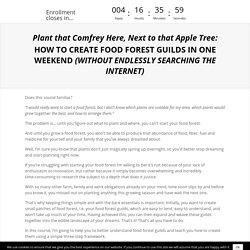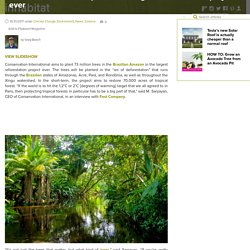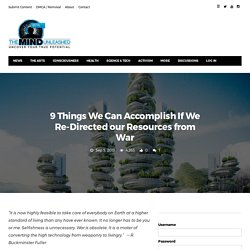Sustainability
> Brigidawakened
Does this sound familiar?

“I would really want to start a food forest, but I don’t know which plants are suitable for my area, which plants would grow together the best, and how to arrange them.” The problem is… until you figure out what to plant and where, you can’t start your food forest. And until you grow a food forest, you won’t be able to produce that abundance of food, fiber, fuel and medicine for yourself and your family that you’ve always dreamed about. Well, I’m sure you know that plants don’t just magically spring up overnight, so you’d better stop dreaming and start planning right now.
If you’re struggling with starting your food forest I’m willing to bet it’s not because of your lack of enthusiasm or motivation, but rather because it simply becomes overwhelming and incredibly time-consuming to research the subject to a depth that does it justice.
73 million trees to be planted in largest reforestation project ever. Conservation International aims to plant 73 million trees in the Brazilian Amazon in the largest reforestation project ever.

The trees will be planted in the “arc of deforestation” that runs through the Brazilian states of Amazonas, Acre, Pará, and Rondônia, as well as throughout the Xingu watershed. In the short-term, the project aims to restore 70,000 acres of tropical forest. “If the world is to hit the 1.2°C or 2°C [degrees of warming] target that we all agreed to in Paris, then protecting tropical forests in particular has to be a big part of that,” said M. Sanjayan, CEO of Conservation International, in an interview with Fast Company. “It’s not just the trees that matter, but what kind of trees,” said Sanjayan.
Related: Hurricane Maria ravaged the only tropical rainforest in the United States. Swap-shop. Read more: - World Economic Forum. If we’re lucky, seed bombing could jump to a whole new level of awesomeness.

A fleet of unused and decommissioned C-130 Hercules cargo planes, originally created to drop land mines, could be recommissioned as foresters. Lockheed Martin — the quintessential military innovation company — and Aerial Forestation Inc, of Newton took an old rusty idea from former UK RAF pilot Jack Walters and turned it into a reality.
Panama Backstory. Facebook. 9 Things We Can Accomplish If We Re-Directed our Resources from War · The Mind Unleashed. “It is now highly feasible to take care of everybody on Earth at a higher standard of living than any have ever known.

It no longer has to be you or me. Selfishness is unnecessary. War is obsolete.
They dump thousands of tons of orange... - Revealed Mysteries. BBC Newsnight - Does economic growth really make our lives...
Fight the War! 13-Year-Old Calls on His Generation to Save the World. We live in a world controlled by money, greed and power.

A world where every single decision that is made determines the kind of world future generations are going to inherit from us. A world built off of the lie that the Earth is a resource for our taking. A world built off a fragile mindset that says we are determined by our wealth, our social class and the amount of power we have. The good thing about a fragile mindset like that is it can be broken, reshaped and then formed into a whole new way of thinking that no one imagined possible.
Since the Industrial Revolution, we began to destroy our natural resources and take the earth for granted. The rivers were polluted with toxic waste, the air was fouled with industrial chemicals, and that’s when people began to see evidence of the destruction of the Earth, and the depletion of its resources.
Off Grid Quest. Study: When Human Consumption Slows, Planet Earth Can Heal. Despite the oft-repeated claim that the recent decline in U.S. carbon emissions was due to the so-called 'fracking boom,' new research published Tuesday shows that it was the dramatic fall in consumption during the Great Recession that deserves credit for this drop.

As nations grapple with the best strategy for decreasing carbon emissions ahead of the upcoming United Nations Framework Convention on Climate Change (UNFCCC) negotiations in Paris, the report, published in the journal Nature Communications, underscores the need for communities to transition away from an economy based on endless growth and towards a more renewable energy system to stem the growing climate crisis. Between 2007 and 2013, the United States—second only to China for the title of world's top polluter—saw carbon emissions fall roughly 11 percent.
Agroecological farming can double food produx in 10 yrs. A new UN report released today is making headlines: Agroecological farming can double food production within 10 years, while mitigating climate change AND alleviating poverty.

Yes!! I was elated to read the morning’s coverage of this highly anticipated report from the UN Special Rapporteur on the Right to Food, Olivier de Schutter. I've been writing on the very real need to prioritize policy support for and investments in agroecology for quite some time, but it is truly encouraging to see such a clear, affirming statement coming from the UN.
Environmental Milestones: A Worldwatch Institute timeline tracing key moments in the sustainability movement from the 1960s to 2004.







